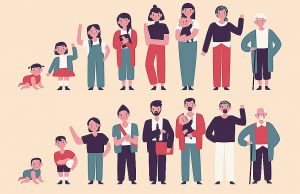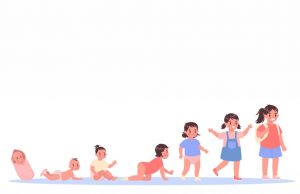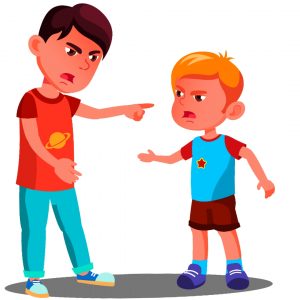Stages Of Life: Life they say is about living. Living is a whole lot of components put together. To live, at first instance, is to be born and that doesn’t end the circle but marks the beginning of a life circle. Most life experiences can be said to be unpredictable but, life stages can be predicated and infact, based on empirical analysis that had been gotten from detailed study, the stages of a human individual can be demistified. Life begins at birth after a period of gestation, and then followed by simple and complex growths and development in the individual.

This is a progressive phenomenon that continues throughout the life time of the individual. It is quite amazing and complex because, even though it is a progressive phenomenon, it doesn’t mean that it is just a single human phase or add, a double phase of human life. The birth, growth, development, adulthood, parenthood and old age are all meant to be factored as stages of human life (even though there are more stages in-between). This is because, each of this life stages comes with a unique chinge in both the body structure, cognitive development, behavioral disposition and in social relations. It is quitr a crucial expository topic (stages of life or stages of human life) because, it’s careful study and analysis provided a telescopic view of one’s self through life and at different points.
Having been able to explain the concept descriptively and subtly pointed out few instances, it then suffices to mention that; based on this article, we would operate or demistify the stages of human life based on the 10 major stages drawn from the available and known stages. This will help us understand the human life circle and the different intermittent stages one passes through known as phases which are quite important and instrumental to the entire stages as a whole because, I particular stage and it’s basic characteristics plays a role in using in a new phase of stage and considerably affects it.
So, the stages might sound and seem indepent but they are intertwined and so, each stage and it’s characteristics are key to the new stage and the very pivotal to the ussering in another or a new stage.
Recommended: Best Countries For Business In The World
10 (Ten) Important Stages of Life
1. Prenatal Stage: This is a stage where conception occurs and relative development begins. At this stage, all major structures of the human body are being formed. this is quite a delicate stage because, the individual is yet to proceed from the mother and so, the well being of the person is attached to the well-being of the mother.

They are both fused and exist dependently until the individual proceeds and and is severed from the mother being the host. A relative characteristics of this stage could be ocassional movement of body parts at a very low rate and heart beats. There could be some kind of reaction to environmental effects but are sometimes not noticed.
2. Infant Stage: This stages marked the birth of the individual and recorded for the first year of the person’s life. Sometimes it could exceed a year but certainly not more than two. This stage is characterized by dramatic display of emotions and growth. Expressions are quite different and unintelligible as the person cries most of the time as a way of expressing needs with blurred vision and subtle auricular capacity, movemenys are limited to body parts.

Their safety at this point are also dependent on their caregivers so also their well-being. There is also the issue of identity placement, the child is keen on identifying some of the closest people through the kind of care they offer. A sucking child identifies the mother first.
Recommended: How to choose the right business to start
3. Toddler Hood: This is another early stage of an individual life span, this stage often starts from eighteen months of the person’s life. At this point, the person begins to learn more basic things and indepently try to show a sense of belonging.
At this stage also, there’s the attempt to show autonomy and self-confidence. This can be achieved if encouraged and can be lost if repressed or suppressed by others. There are also a lot of curioucity at this stage and the desire to learn the basics.
Recommended: Oldest books in the world 2022
4. Early Childhood: Early childhood can equally pass off as the preschool stage. It is the primary stage succeeding the toddler stage and usually begins from the 3rd year of the person’s life. At this stage, Language development are being processed as well as auricular capacity being advanced. The child could hear more and attempt to process a language and even issue a response.

However, these secondary characters are/ quite at it’s formulation and developmental stages and so, might not yet be ready to be used in full capacity. Another unique characteristics of this stage is fear and subtle conceptions about basic things but they are or usually at a very small degree. So, a child might not be so scared at this point but might at some point react in a way that shows fear for example, if something goes close to the eyes , he might decide to close it.
5. Middle Childhood: At this stage, the child is exposed to other people without rules. They are left to experience and experiment life without any sense of restrictions as to rights or wrong or liabilities and responsibilities.
They are open to imagination and curioucity but they only have little to be curious about as they are still in the growth and developmental stage and so, some biological characteristics that would have spurred intense curioucity are yet to be fully developed and launched. At this stage, the individual is inquisitive but quick to withdraw if he or she encounters any form of challenge.
Recommended: Differences Between British and American English
6. Adolescence: Adolescence is a more advanced stage than the middle Childhood. This stage is full of curioucities and desire to try new things. It is a stage of intense learning as the person is ready, physically, mentally and biologically ready to experiment new ideas. It is quite crucial and sensitive. This is also due to the fact that at this stage, there has been a an attainment of growth on an advanced level. This is a period also known as puberty.
The person has gotten to experience physical and biological developments that are new and unusual to them and are inquisitive about them, in this stage, the desire for detailed learning is hightened. This is the stage where the sense of fear, love, hate and other strong emotions and desires are built and developed but are relatively new to the individual and so, they need explanations to them otherwise, they venture out for answers.
7. Young Adulthood: The Young adulthood stage is factored in the twenties and thirties of an individual. Just afyer adolescence. at this stage, some mistakes are encountered, and there are urge to figure out somethings and provide solutions to some mind bugging challenges.
Feelings and affections of all kind are hightened and the will for self control are yet to be fully understood and used. This calls for guidance from guardians and parents in order to set the individual on a right track with less urge and vulnerability to mistakes.
Also see: How to become a successful musician
8. Middle Adulthood: This stage is said to span through late thirties to the mid-sixties. Concerns begins to change and get diversified. There is also shift in priorities and the much needed experience gathered from the early years to correct some mistakes and forge new paths.

At this stage, it about a sense of Achievement and responsibilities. Other features like aging sets in to change the individuals physical appearance. Productivity and growth becomes imperative.
9. Late Adulthood: This period or stage can be looked at from two dimensions or categories which are the young old people and the very old people. The young old people are those considered to be in their mid-sixties and the late seventies. This stage is a stage of retirement and rest, it is characterized by organization and the sense of legacy. It is a stage when the individual wants to leave a foot print and so, most live actions are no longer as important as they used to be, the individual has father’s enough knowledge and experience and so, a legacy becomes more important.
Then there is the very old stage which is characterized by pride, satisfaction or regrets. It is a stage of reflection and taking account if life’s experience and the decisions taken. It begins from the eighties. This stage is characterized by more visible physical changes and most times, biological changes as well.
Recommended: Most Used Apps in The World 2022
10. Death: Death is a stage in life and even though it is not mostly considered or factored as a life stage by many writers it remains an inevitable human stage when the individual is looked upon as ripe or likely to die. This is a stage of total surrender and peace. The individual is at this stage feeble and ripped off of most of their strength.

Recommended: Relationship Between Psychology and Law
In conclusion, it is very important to know and understand that life is built and lived in stages and each stage has its own peculiar characteristics that the individual displays. This will help us understand life, people’s actions and inactions at some point in their lives and help relate with others more efficiently.

Edeh Samuel Chukwuemeka, ACMC, is a lawyer and a certified mediator/conciliator in Nigeria. He is also a developer with knowledge in various programming languages. Samuel is determined to leverage his skills in technology, SEO, and legal practice to revolutionize the legal profession worldwide by creating web and mobile applications that simplify legal research. Sam is also passionate about educating and providing valuable information to people.